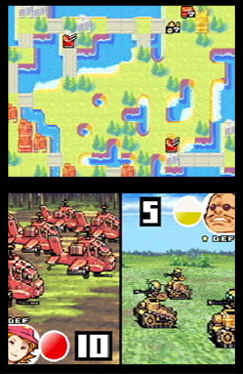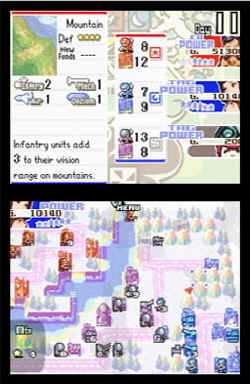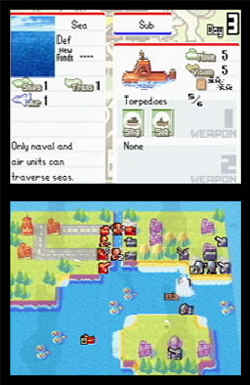Strategy gamers are arguably some of the most
hardcore amongst us. They spend hours managing the slightest of details, manipulating
troops, and delving into hundreds of pages of an instruction book. Advance Wars
however, is for the rest of us. Critically praised awarded, and recognized, the series (in
just two installments) has become one of the most memorable of this entire generation.
 It's a game that has also shown it's not about the graphics. The
simple, 2-D art style remains intact here on the DS in the third entry, Advance Wars:
Dual Strike. The gameplay is still roughly the same, the changes sometimes
frustrating, but this is a system seller.
It's a game that has also shown it's not about the graphics. The
simple, 2-D art style remains intact here on the DS in the third entry, Advance Wars:
Dual Strike. The gameplay is still roughly the same, the changes sometimes
frustrating, but this is a system seller.
There's little use of the touch screen, which may initially seem strange given the grid
and turn-based movement. You can use it to do everything, but the d-pad is perfect, and
the sometimes over-reactive touch screen leads to moves you didn't want to make. The game
does make use of the top screen, and that's the point that may irritate fans.
Things are the same on the ground, strategically maneuvering troops in various forms to
the enemy base for capture. If that's too much of a task, take out every force on the
screen. Each vehicle or troop type has perfectly balanced positives and negatives. There
is nothing in this game, just like the previous two, that has a supreme advantage over
another. Everything has an exploitable flaw.
 The top screen in most stages will also let you know the
specifics. It's convenience at its best, as a quick glance after hovering the cursor will
bring up the information. The other uses of that second screen create the problem, even if
it's only used a few times.
The top screen in most stages will also let you know the
specifics. It's convenience at its best, as a quick glance after hovering the cursor will
bring up the information. The other uses of that second screen create the problem, even if
it's only used a few times.
Air combat now plays a role, as the separate battles are raged in the sky, while the
standard one continues on the ground. The aggravating part is that the action on top is
controlled entirely by the AI. All the player can do is set basic commands for aggression
or defense. Granted, it's smart enough to complete the job. For a game to take any control
away from the player, especially one with so much strategy as this, is inexcusable.
 Other than that, the changes to this edition are all for the
better. The new Dual Strikes (hence the subtitle) allow two generals to combine their
power for one brief, total onslaught. You can also tag out in stages that allow for dual
generals, benefiting from their specific advantages when needed. It adds a deeper layer
than you would expect, and when used properly, can pull you out of even the toughest
scenarios (and this is hardly an easy title).
Other than that, the changes to this edition are all for the
better. The new Dual Strikes (hence the subtitle) allow two generals to combine their
power for one brief, total onslaught. You can also tag out in stages that allow for dual
generals, benefiting from their specific advantages when needed. It adds a deeper layer
than you would expect, and when used properly, can pull you out of even the toughest
scenarios (and this is hardly an easy title).
The final addition (aside from touch screen control when creating personal maps) is a
small action game. You're offered full control over a single troop at a time, from the
same view as the standard game. It's generic, the controls are clunky, and no action game
fan will stick with this very long. It negates the entire purpose of the game for strategy
players
It's not important how changed the game is over its predecessors. What's important are the
level set ups, the involving strategy, time consuming back-and-forth matches, and constant
fun. The only thing missing here is online play (which Nintendo has yet to address) though
the wireless feature of the DS is a major improvement over the Game Boy Advance. As
redundant as it sounds, this is yet another potential game of the year candidate on the
DS, a system that is quickly becoming a dominating force and it's all because of software
like this.